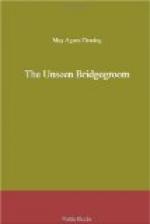The bride and her attendant left the room without a word. The bridegroom produced the bandages again.
“I regret the necessity, but I must bind you again. However, it will not be for long; in a couple of hours you will be at home.”
With wonderful skill and rapidity, hands, eyes, and mouth were bound once more; the parson was led down-stairs, out into the wet night, and back to his seat in the carriage. The masked man took his place beside him. John Jones mounted to the driver’s perch, and they were off like the wind.
The promised two hours were very long to the rector, but they ended at last. The carriage stopped abruptly; he was helped out, and the bandage taken from his eyes and hands.
“The other must remain for a moment or two,” said the mysterious man with the mask, speaking rapidly. “You are at the corner of your own street. Good-bye, and many thanks!”
He sprung into the carriage, and it was gone like a flash. And the Reverend Raymond Rashleigh, in the gray and dismal dawn of a wet morning, was left all agape in the deserted street.
CHAPTER IX.
ONE WEEK AFTER.
On that eventful night of wind and rain upon which the Reverend Raymond Rashleigh performed that mysterious midnight marriage, Mr. Carl Walraven paced alone his stately library, lost in thought—painful thought; for his dark brows were contracted, and the Grecian heads in the brackets around him had no severer lines than those about his mouth.
While he paces up and down, up and down, like some restless ghost, the library door opens, and his wife, magnificently arrayed, with jewels in her raven hair, a sparkling fan dangling from her wrist, an odor of rich perfume following her, appears before him like a picture in a frame.
She is superbly handsome in that rose-colored opera-cloak, and she knows it, and is smiling graciously; but the swarth frown on her husband’s face only grows blacker as he looks at her.
“You are going, then?” said Mr. Carl Walraven.
“Going?” Mrs. Walraven arches her black eyebrows in pretty surprise at the word. “Of course, my dear. I would not miss ‘Robert le Diable’ and the charming new tenor for worlds.”
“Nor would you obey your husband for worlds, madame. I expressly desired you to stay at home.”
“I know it, my love. Should be happy to oblige you, but in this case it is simply impossible.”
“Have you no regard for the opinion of the world?”
“Every regard, my dear.”
“What do you suppose society will say to see you at the opera, dressed like a queen, while we are all mourning poor Mollie’s loss?”
“Society will say, if society has common sense, that Mrs. Walraven scorns to play hypocrite. I don’t care for Mollie Dane—I never did care for her—and I don’t mourn her loss in the least. I don’t care that”—the lady snapped her jeweled fingers somewhat vulgarly—“if I never see her again. It is as well to tell you the truth, my dear. One should have no secrets from one’s husband, they say.”




